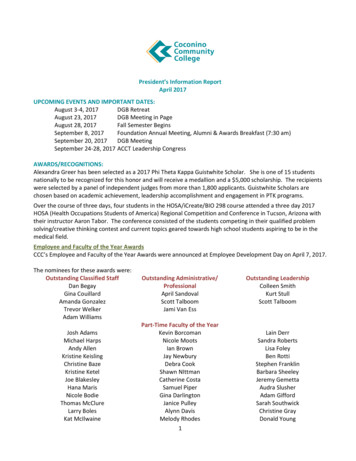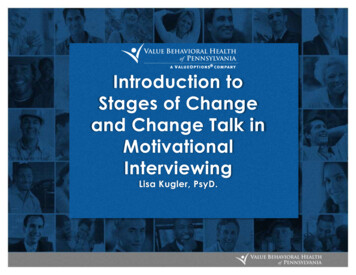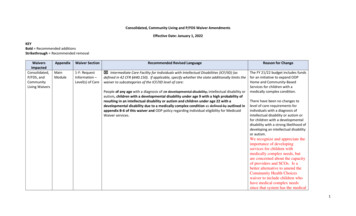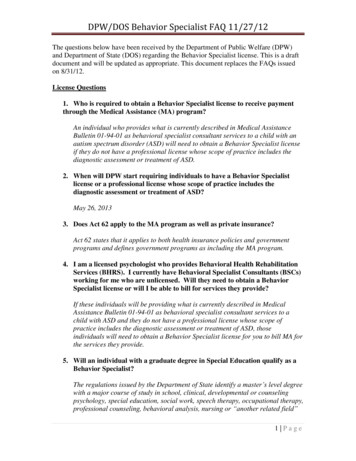
Transcription
APRIL 2017NEWSGovernment AffairsRCPA 2017Capitol DayState Capitol Tours — available every half hour. Tours meet in the MainRotunda at the information desk.RCPA is hosting Capitol Dayon Tuesday, April 25 to advocate for a realistic budget thatoffers the supports required byPennsylvanians in need of adultand children’s mental health,brain injury, medical/vocationalrehabilitation, intellectual anddevelopmental disabilities, substance use, and autism services. Itis important that members takeaction! RCPA urges members,supporters, consumers, and families to join us at Capitol Day andlet elected officials know theseservices are essential and must besupported.Continued on page 3
NEWSContentsAPRIL 2017Richard S. Edley, PhDPresident and CEOStephen H. SuroviecCOO/Director, IDD DivisionLynn CooperDirector, Drug & Alcohol Division,Western Region RepresentativeMelissa DehoffDirector, Rehabilitation ServicesDivisionsSarah Eyster, MSWDirector, Mental Health Division,Eastern Region RepresentativeCindi HobbesDirector, International PediatricRehabilitation CollaborativeCindy LloydOffice Manager/HRTieanna LloydAccounts Receivable/Membership Services ManagerTina MileticAssistant to the President/CEO,Finance ManagerSharon MilitelloDirector, CommunicationsJack Phillips, JDDirector, Government AffairsRobena L. Spangler, MSDirector, Children’s DivisionRehabilitation and CommunityProviders Association777 E Park Dr, Ste 300Harrisburg, PA 17111-2754717-364-3280 — Phone717-364-3287 — Faxwww.paproviders.org145566778101112Government AffairsMembershipFederal NewsState NewsMedical RehabilitationMental HealthPhysical Disabilities & AgingBrain InjuryDrug & AlcoholIDDChildren’s ServicesCalendar 2017. This monthly newsletter is written by the Rehabilitationand Community Providers Association (RCPA) for the health andhuman services communities. Deadline for publication is the20th of every month or the Friday before.
Government Affairs continuedRCPA 2017 CAPITOL DAYContinued from page 1General Agenda9:00 am – 3:00 pmRCPA Table – Main Rotunda9:00 am – 3:00 pmRCPA Leadership and Member Legislative Visits –Capitol Complex12:00 pm – 1:00 pmPress Conference/Rally – Main RotundaRally Agenda12:00 pm – 12:05 pm12:05 pm – 12:15 pm12:15 pm – 12:45 pmWelcome and IntroductionsRCPA President/CEO RemarksLegislator Commentsa. Sen. Ryan Aumentb. Sen. John Blake (tentative)c. Sen. Wayne Langerholc (tentative)d. Rep. Mike Sturlae. Rep. Aaron Kaufer12:45 pm – 12:47 pmThank you to Legislators and Introduction ofPA Chapter of American Foundation for SuicidePrevention12:47 pm – 12:55 pmIntroduction of the Student Winners for thePennsylvania Youth Suicide Prevention Initiative –PSA’s; Comments from Winners12:55 pm – 1:00 pmFinal Comments/ConclusionLegislativeTrackingRCPA is constantly trackingvarious policy initiativesand legislation that mayhave positive or negativeeffects on our membersand those we serve, so foryour convenience, RCPAhas created a legislativetracking report. You canreview this tracking reportto see the legislative initiatives that the GeneralAssembly may undertakein the 2017/18 LegislativeSession. If you have questions on a specific bill orpolicy, please contactJack Phillips. FSpecial HotelRoom Rate forRCPA MembersThe Crowne Plaza in downtownHarrisburg has given RCPAmembers, who will be stayingovernight on April 24, a specialroom rate of 129. When callingfor a reservation or if using theweb link, please use block codeRCP. The 129 room rate includesbreakfast.RCPA asks members to scheduletheir own legislative appointments. Once appointments aremade, please notify RCPA’s Director of Government Affairs, JackPhillips, with appointment times.Further questions may be directedto Jack Phillips. FRCPA’S 4th Annual Golf OutingREGINO STERW!Calling all golfers (and those who pretend to play golf like Jack),it’s time to register for RCPA/RCPA PAC’s 4th annual golf outing atthe beautiful Hershey Country Club, 1000 East Derry Road, Hershey,PA 17033 on Thursday, May 11. Registration starts at 10:30 am, lunch begins at11:00 am, followed by a putting contest and 12:30 pm shotgun start.Golf outing sponsorships are also available. We hope you will consider becoming agolf sponsor; it is a great way for your organization to get noticed and an opportunity to support a worthy cause.The RCPA Political Action Committee (PAC) raises money and supports campaignsof state legislators who work tirelessly on issues that benefit mental health, intellectual/developmental disabilities, substance use, brain injuries, medical and vocationalrehabilitation, and other related human services. The funds raised through RCPAPAC can make the difference between a win and a loss on an issue or assist in making a new ally. Even if you can’t be a strong contributor to RCPA PAC fundraisingefforts, we all have friends and business associates who are interested in helping ourallies to victory. Getting involved in RCPA PAC not only allows you to help make decisions on who the committee supports, but also helps to identify new folks who willjoin in our successes. Further questions may be directed to Jack Phillips. FR C PA N E W S A A P R I L 2 0 1 73
MembershipRCPA Congratulates NewExecutive Director of UCP of PANew MembersBUSINESSBaker Tilly1650 Market St, Ste 4500Philadelphia, PA 19103Malorie Goldblatt, Senior MarketingAssociateFriel Lokuta Stauffer HSC, LLC4200 Crums Mill Rd, Ste 203Harrisburg, PA 17112Kevin Friel, PrincipalAs the largest state association of itskind, RCPA continues to look for ways tostrengthen its voice. One way to facilitatethis is by the recruitment of new members. For new provider members, thereare financial incentives for the first twoyears of membership. If you have questions about membership or know of anorganization that would benefit frommembership with RCPA, please contactTieanna Lloyd, Accounts Receivable/Membership Services Manager. FMembers in the News UPMC Moving Into The Central PAHealth Market RCPA Member Magellan HealthSelected as One of Fortune Magazine’s World’s Most AdmiredCompanies F4R C PA N E W S A A P R I L 2 0 1 7Effective April 1, 2017, Paula Czyzewski will be the newExecutive Director of UCP of PA. She assumes this statewide role in addition to remaining Executive Director ofBlossom Philadelphia (formerly UCP of Philadelphia). RCPAalso extends congratulations to Judith McCowan who wasrecently announced as the new head of UCP Central PA. JeffCooper currently serves in both roles and is retiring effectiveApril 30. FRCPAIs GoingGreen!We are happy to report that RCPA is taking steps tobecome more environmentally friendly. As part ofour going-green effort, we will be offering meetingmaterials (agendas, handouts, etc.), as well as otherdocuments, in a convenient, easy-to-access, digitalformat for our members. What does this mean foryou? It means that meeting handouts, membershipcertificates, and other materials will be emailed toyou, enabling you to print them and/or save to yourfiles for easy access on your mobile device or laptopand for future reference.Here are some of the benefits to going green:E Helps the environment through conservation;E Cuts printing costs and increases efficiency,making your membership dues go even further;E Adds convenience by making documents morereadily available for easy access.RCPA is committed to doing its part in helping theenvironment and becoming more efficient. If youhave any questions about this initiative, please donot hesitate to contact Sharon Militello. F
Federal NewsFederal HHS/CMS Open toExtending HCBS Rule DeadlineNewly appointed US Health and Human Services (HHS) Secretary Tom Price and Centers for Medicare and Medicaid Services (CMS) Administrator Seema Verma sent aletter to all governors in which a number of Medicaid-related issues were discussed.The letter begins with Secretary Price and Administrator Verma affirming their “partnership” with the states “in improving Medicaid and the lives of those it serves.” Theletter discusses a number of issues, including the Affordable Care Act, the Medicaidstate plan amendment approval process, employment and community engagement,Medicaid and private insurance alignment, the CMS Home and Community-BasedServices (HCBS) rule, and the opioid epidemic.Regarding the HCBS rule, Secretary Price and Administrator Verma wrote, “ CMSwill work toward providing additional time for states to comply with the HCBSrule,” and they “will be examining ways in which we can improve our engagementwith states on the implementation of the HCBS rule, including greater state involvement in the process of assessing compliance of specific settings.” Currently, thedeadline for states to be in compliance is March 17, 2019. The entire letter is available for anyone to view. FPresident TrumpSigns ExecutiveOrder RequiringRegulatory ReformOn February 24, 2017, PresidentTrump signed an ExecutiveOrder requiring every agency toestablish a Regulatory ReformTask Force to eliminate red tape.Essentially, the task forces arerequired to research all regulations that are unnecessary,burdensome, and harmful tothe economy, and make recommendations to repeal or simplifythose regulations. FState NewsISP TimeframeReminder IssuedIn MemoriamWith regret, RCPA has learned ofthe passing of OMHSAS DeputySecretary Dennis Marion. Oursincere condolences go out toMr. Marion’s family and colleagues.Here is the announcement fromthe State. FDr. Dale Adair Leaving PennsylvaniaDr. Dale Adair, the Medical Director for OMHSAS, will be leaving Pennsylvaniaat the end of the fiscal year. Dr. Adair received the RCPA Community LeadershipAward in 2016. Dr. Adair and his team were instrumental in securing funding forthe Certified Community Behavioral Health Clinic (CCBHC) model being implemented in several locations around Pennsylvania on July 1 of this year. Dr. Adairwill join his wife in South Carolina to further his work in psychiatry. FThe Office of Long-Term Living(OLTL) has received inquiries regarding the length of time it is takingfor Service Coordinators to contactnewly enrolled waiver/programparticipants, schedule the firsthome visit, and submit the InitialIndividual Service Plan (ISP). As aresult, providers were remindedof the bulletin, Individual ServicePlan Development, Review andImplementation, that was issuedand effective on October 14, 2016.This communication served as areminder of the Service Coordinator’s Initial ISP developmentresponsibilities upon receipt of theparticipant’s completed informationfrom the Independent EnrollmentBroker (IEB). FR C PA N E W S A A P R I L 2 0 1 75
Medical RehabilitationMarket Saturation andUtilization Data ToolAvailableThe Centers for Medicare and Medicaid Services(CMS) has posted to their website, the Market Saturation and Utilization Data Tool, whichincludes an interactive map and a data set thatshows national, state, and county level providerservices and utilization data for selected healthservices areas. This data can be used by CMS tomonitor market saturation as a means to prevent fraud, waste, and abuse. The data can alsobe used to reveal the degree to which use of aservice is related to the number of providers servicing a geographic region. The fourth releaseof the data tool includes a quarterly update ofthe data to the eight health services areas fromrelease 3, and also includes Physical and Occupational Therapy and Clinical Laboratory (BillingIndependently) data. Release four will thereforeinclude four, twelve-month reference periodsand the following health service areas: HomeHealth, Ambulance (Emergency, Non-Emergency,Emergency & Non-Emergency), IndependentDiagnostic Testing Facilities (Part A and Part B),Skilled Nursing Facilities, Hospice, Physical andOccupational Therapy, and Clinical Laboratory(Billing Independently). Future releases mayinclude comparable information on additionalhealth service areas. FMedPAC Discusses UnifiedPost-Acute Care ProspectivePayment SystemDuring the March 2, 2017, Medicare Payment AdvisoryCommission (MedPAC) public meeting, there was a presentation on implementing a unified post-acute careprospective payment system (PAC PPS). The ImprovingMedicare Post-Acute Care Transformation (IMPACT) Actmandates that MedPAC and the Department of Healthand Human Services (HHS) separately evaluate anddevelop PAC PPS prototypes. The full report on this willbe issued in June. FNHSN Data Submission Deadlinefor IRFs Extended to May 15The Centers for Medicare and Medicaid Services (CMS)announced they would be extending the 2016 third quarter submission deadline for inpatient rehabilitation facilityquality reporting program (IRF QRP) data submitted viathe Centers for Disease Control and Prevention NationalHealth and Safety Network (NHSN) to May 15, 2017. FMental HealthCCBHC Steering Committee Re-ConvenesOn March 3, the steering committee for the Certified Community Behavioral Health Clinics (CCBHCs) met to learnabout the diabetes prevention program currently beingoffered through the Department of Health as well as theAsthma Control Program. CCBHCs were asked to reviewthe responsibilities and guidance document provided byDr. Dale Adair and comment.6R C PA N E W S A A P R I L 2 0 1 7Finally, it was reported that regulatory barriers are beingdiscussed as well as planning for licensing visits to CCBHCs.It is expected that there will either be a joint visit or onlyone site licensing visit for the CCBHCs, as opposed to DDAPand OMHSAS/BHSL separately. F
Physical Disabilities & AgingPA ABLE Launch AnnouncementOn March 17, the Pennsylvania Department of the Treasury announcedthat the official launch of its PAAchieving a Better Life Experience(ABLE) Savings Program will occuron Monday, April 3, 2017, at a mediaand legislative event in the CapitolRotunda at 12:30 pm. On that date,the PA Treasury ABLE program officially begins accepting accounts forenrollment and opens the door onhope for individuals with disabilitiesand the families who care for thoseloved ones. Kathleen F. McGrath, Esq.,PA Savings Programs Director, invitesstakeholders to join Treasurer JoeTorsella, US Senator Robert Casey, andPA Senator Lisa Baker as ABLE officially opens for business.Pennsylvanians with eligible disabilities are about to receive the toolsthey need to build a sound fiscalfuture. ABLE accounts mean a new,fresh perspective on what living asa financially empowered individualcan mean. A PA ABLE account givesindividuals with qualified disabilities(Eligible Individuals), and their families and friends, a tax-free way to savefor disability-related expenses, whilemaintaining government benefits.Federal and state law authorized thecreation of PA ABLE accounts; additional information is available online.The Pennsylvania Department of theTreasury welcomes the attendanceof all stakeholders. Attendees areasked to RSVP with your name andthe number you are bringing with youby March 30, 2017. Additional detailswill be provided to you once you RSVPyour attendance.Stakeholders are invited to share thisinformation with anyone who has astake in the successful launch of thisnew product. While program materialwill be available at the launch event,PA ABLE asks that requests for bulkmaterial and outreach or speakingopportunities are sent by email.The more people who know aboutthis program and what it means tobe ABLE to look to living a securedfuture, the better.Ms. McGrath also invites stakeholders to follow the Twitter handle@PATreasury for the latest updates,and help drive the conversation withthe hashtag #PAABLE. FMedical RehabilitationBrain InjuryCRCC Offers New Course in TBIThe Commission on Rehabilitation Counselor Certification (CRCC) recently announced a new course,TBI: Optimizing Vocational Rehabilitation throughRecreation and Leisure, which offers seven continuing education clock hours. The course objective isto extend the vocational rehabilitation process withsupplementary treatment modalities to provide thenecessary framework and tools to help maximizevocational skill-building to individuals with TraumaticBrain Injury (TBI). FR C PA N E W S A A P R I L 2 0 1 77
Brain InjuryDrug & AlcoholCDC ReportHighlights LatestData and Resultson Leading Causesof TBIThe Centers for Disease Control andPrevention (CDC) recently releaseda report, Traumatic Brain InjuryRelated Emergency Department Visits,Hospitalizations, and Deaths – UnitedStates, 2007 and 2013, which includesthe latest data and reported resultson the leading causes of TraumaticBrain Injury (TBI) by age group andgender. FBIAA Signs OntoLetter SupportingOutpatient TherapyServices Cap RepealLegislationThe Brain Injury Association of America(BIAA) signed onto a letter initiatedby the Coalition to Preserve Rehabilitation (CPR) to show their support ofthe Medicare Access to RehabilitationServices Act of 2017, also known as theoutpatient therapy services cap repeallegislation. Individuals with stroke,brain injury, and other serious disabilities and chronic conditions often needintensive and ongoing rehabilitationcare to improve their health status,maintain their functional abilities, andprevent deterioration of function. CPRhas long argued that therapy caps arearbitrary and harm beneficiaries mostin need of rehabilitation. CPR explainsthat outpatient therapy services shouldbe administered in the best interestof individuals needing rehabilitation,rather than based on arbitrary limitations on coverage. This legislationwas introduced in both the House andSenate. F8R C PA N E W S A A P R I L 2 0 1 7Transition from PCPC toASAM Placement Tool in PADDAP has, in consultation with the Governor’s Policy Office and theOffice of General Counsel, weighed options for continuing the use ofits PCPC (Pennsylvania Client Placement Criteria) tool for determining the appropriate level of care for an individual seeking treatmentor already within its treatment system. After weighing the options,DDAP has decided, with the support of the Governor, that “ thebenefits of using a customized tool no longer exceed the benefits ofusing the nationally recognized ASAM (American Society of Addiction Medicine) tool. One reason for the transition stems from theCenters for Medicare & Medicaid Services (CMS) Medicaid ManagedCare Final Rule that was issued last summer, which will limit federalreimbursement for residential treatment of Medicaid recipients to 15days. In response to that rule, and specifically the provision relatedto the IMD exclusion, Pennsylvania aims to better position itself insubmitting a 1115 waiver to CMS related to the IMD exclusion. The1115 waiver application requires the use of the ASAM tool. This issuesurrounding the IMD exclusion is not the only reason for makingthe change, however. The newly acquired treatment data system isalready equipped with the ASAM continuum of care which will makethis new system more usable with fewer modifications, which limitsthe risk of future system maintenance issues. Additionally, becausethe ASAM is currently utilized for placement decisions related to adolescents, and by many commercial insurance providers for both adultsas well as adolescents, converting to this tool will create consistencyfor providers and payers across the treatment system.”DDAP has emphasized that it understands that this major change willnot come without its challenges. DDAP has a team of employees whoare currently in the process of establishing a strategic plan for transitioning from the PCPC to the ASAM and will be gathering input fromstakeholders and establish a workable process that moves to the useof the ASAM over time, with the goal of full implementation occurring by July 2018. More information will be shared on the progressand impacts of this effort. RCPA looks forward to working with DDAPas the process unfolds. F
Drug & AlcoholCenters of Excellence UpdateFROM DDAPCenters of Excellence (COEs) help ensure that people with opioid-relatedsubstance use disorder stay in treatment to receive follow-up care andare supported within their communities. The centers coordinate care forpeople with Medicaid, and treatment is team-based and “whole person”focused, with the explicit goal of integrating behavioral health and primary care. The COEs have put in place infrastructures and are hiring caremanagement teams and beginning to provide services to those with opioid use disorder (OUD) under the COE model. The first data report wasdue from COEs on February 15 and is due monthly thereafter. Of the 45COEs, 26 reported on February 15 that they so far have interacted with 582patients. Many of the COEs that did not report are Phase II COEs and onlybegan operating in January. Infrastructure includes development of effective referral systems in a “no wrong door” network among physical healthproviders (e.g., health systems, primary care practices), behavioral andmental health providers, the criminal justice system, and other treatmententry points. Patient interactions include face-to-face meetings betweenproviders and patients, level of care assessments, and care managementactivities. DHS is continuing to collect and analyze the submitted data toensure its integrity as well as provide ongoing assistance to COEs to ensurequality reporting. RCPA is proud to report that many of the COEs are members of the association. FPrescription DrugTake-Back ProgramSAMHDA Launches Improvements toPublic-Use Data Analysis SystemThe Substance Abuse and Mental Health Data Archive (SAMHDA) hasmade significant improvements to the Public-Use Data Analysis System(PDAS) Through this system, you can perform online analyses to createcrosstabs and perform logistic regression from your web browser. You canalso download output and underlying data in .csv format. Upgrades toPDAS include state data for the National Survey on Drug Use and HealthSmall Area Estimate, mapping and visualization tools, and an enhanceduser interface. You are invited to try out PDAS and explore the spectrumof available public use files. If you have questions or require technicalassistance, please contact the SAMHDA Help Desk via the online technicalassistance form or by calling 888-741-7242. FThe Pennsylvania Prescription DrugTake-Back Program is focused onalleviating the health and safetyconcerns from the diversion andabuse of prescription drugs by helping our citizens properly disposeof unused prescription medications. Many young people whoabuse prescription drugs take themfrom medicine cabinets. Keepingunused opioids or other commondrugs of abuse in a medicine cabinetis no longer safe or responsible.Prescription drug misuse, abuse,and overdose are growing concernsacross the nation. According to a2015 survey in Pennsylvania, 41.0%of prescription-drug-using studentsindicated taking the drugs from afamily member living in their home,41.8% indicated that a friend orfamily member gave them to thestudent, 26.9% indicated that theybought the drugs from someone,14.1% indicated they took themfrom someone not related to them,and 12.9% indicated they tookdrugs from relatives who were notliving in their homes.DDAP, in partnership with thePennsylvania Commission on Crimeand Delinquency (PCCD) and thePennsylvania District AttorneysAssociation (PDAA), has worked tofacilitate the installation of secure,permanent prescription drugtake-back boxes in communitiesthroughout the state. Find a permanent Drug Take-Back Location. FR C PA N E W S A A P R I L 2 0 1 79
IDDRCPA SubmitsComments onWaiver AppendicesIn response to a February 18,2017 Pennsylvania Bulletin noticefrom the Department of HumanServices, RCPA submitted comments on Appendix I: FinancialAccountability and Appendix J:Cost Neutrality Demonstration ofthe Office of Developmental Programs’ (ODP) Consolidated andPerson/Family-Directed Services(P/FDS) Waivers. The commentswere developed by a work groupconvened by RCPA’s Intellectualand Developmental DisabilitiesCommittee.During this same time, ODPissued draft rates for its servicesbut indicated they were in draftform and no public commentswere being accepted. Opportunities to comment on thesedocuments once in final formwill be provided at a later date,according to ODP.In past communications, ODPhas said the new waivers willbe effective July 1, 2017. Thisincludes all the new servicedefinition changes and the newrates, except for the change inhow residential services will bereimbursed (moving from a costbased approach to a fee schedulemethodology), which ODP hassaid will take place January 1,2018.Additional information regarding the proposed Appendices Iand J of the Consolidated andP/FDS Waiver renewals, as well asthe draft rates, can be accessedonline. F10R C PA N E W S A A P R I L 2 0 1 7Brain InjuryRCPA Testifies at Legislative Hearings onCommunity ParticipationOn March 13, 2017, RCPA’s Chief Operating Officer and Intellectual/Developmental Disabilities Division Director, Steve Suroviec, presented testimony beforethe House Human Services Committee on the Community Participation SupportService proposed by the Office of Developmental Programs (ODP). RCPA BoardMember and Venango Training and Development Center’s Chief ExecutiveOfficer, Colleen Stuart, was also present to answer questions from committeemembers. Committee Chairman Gene DiGirolamo (R – Bucks) scheduled thehearing.The testimony included statements of support for the concept of the service,which could provide greater flexibility to people with disabilities and serviceproviders, and for Governor Wolf’s “Employment First” executive order. In lightof recent changes and clarifications made by ODP to the Community Participation Service definition, RCPA announced in February that it was withdrawing itsopposition to the service proposal. RCPA’s testimony outlined the reasons whyit had withdrawn its opposition, but it also identified a number of concernsthat still remain relative to how the ODP compromise would be implementedand their impact on individuals with disabilities.RCPA CEO Richard Edley provided similar testimony during a March 23 publichearing held by the Senate Democratic Policy Committee at Handi-Crafters inCoatesville, Pennsylvania. The hearing was held at the request of State SenatorAndy Dinniman (D–Chester). Handi-Crafters is an RCPA member. F
IDDIUP Studying Rural Jobs forPeople With IDDResearchers at Indiana University of Pennsylvania (IUP)are engaged in a research project entitled “EmploymentOpportunities for Rural Residents with Disabilities inPennsylvania,” commissioned by the Center for RuralPennsylvania. The study will examine the opportunitiesand barriers to competitive-integrated employment forindividuals with intellectual/developmental disabilities inrural areas. The research will also involve understandingthe options and challenges for community providers whenaddressing these barriers, the strategies other states areusing, and the resulting policy implications.RCPA is assisting IUP wherever possible on this importantresearch. The research team from IUP asked to get inputfrom RCPA members about their perspectives, specificallysupports coordination organizations (SCO) and vocational/employment service providers. Focus group sessions wereheld in March in conjunction with RCPA regional meetingsin Wilkes-Barre, Blue Bell, and Harrisburg. Two more focusgroups are expected to be held during April in Clarion andPittsburgh. The information gleaned from these sessionswill inform the researchers’ findings and conclusions. RCPAis hopeful the PA General Assembly, of which the Centerfor Rural Pennsylvania is an arm, will find the recommendations helpful when the project is completed. FDHS Allows “Choice Exception”in Revised CommunityParticipation PlanThe Secretary of Human Services, Ted Dallas, circulateda message on March 3, 2017, to stakeholders of servicesfunded through the Office of Developmental Programs(ODP) that outlined changes DHS was making to itsproposed Community Participation Support Servicedefinition. The Secretary’s message, and later affirmedin his testimony provided to the House Human ServicesCommittee on March 13, said “It is critical to reiteratewe are not closing workshops or adult day programs.Each individual has the choice of whether or not toparticipate in community activity, the amount, andfrequency. That determination will be made with theirISP (individualized service plan) team.” The changeswere made by DHS after receiving public comments onits original proposal, which would have restricted individuals from spending more than 25% of their weeklyservice time in a licensed vocational facility or licensedadult training facility. Under the revised plan, individuals must be afforded the opportunity to receive servicesoutside a facility program for 25% of their monthlyservice time, but will not be forced to do so. FChildren’s ServicesChildren’s Steering Committee at WorkThe meeting of the Children’s Steering Committee onMarch 29 was dedicated to developing a comprehensiveplan for aligning the RCPA Children’s division prioritieswith those established by DHS. As policymakers at thefederal level are proposing changes that would overhaulthe Medicaid program, we need to focus on the realitiesfacing Pennsylvania’s children, youth, and families. Wealso need to sustain focus on the work ahead of us on thefederal, state, and local levels. Over 1 million children inPA rely on the Medicaid program for health care coverage.The American Health Care Act proposes to limit the federalshare and implement a per capita cap. According to factspublished by PA Partnerships for Children, the number ofuninsured children is at 4.1%, an all-time low*. If Medicaidis implemented on a per capita cap, the methodology forenrolling families and children increases risk of losing coverage. Huge cuts or limitations to federal funding will alsomean that PA will be responsible for the financial hardshipcreated by The American Health Care Act – at a 3 billiondollar deficit already experienced here in our state. Thesteering committee, in conjunction with RCPA children’sservice
UPMC Moving Into The Central PA Health Market RCPA Member Magellan Health . Federal HHS/CMS Open to Extending HCBS Rule Deadline Newly appointed US Health and Human Services (HHS) Secretary Tom Price and Cen- . announced they would be extending the 2016 third quar-RCPANEWS A APRIL 2017 . RCPANEWS A APRIL 2017 . RCPANEWS A APRIL 2017 .










